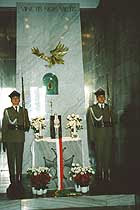









Poland holds commemoration for WWII Katyn massacre
19 hours ago
WARSAW (AFP) — Poland's President Lech Kaczynski paid homage Friday to thousands of Polish soldiers who were killed in the Soviet Union after being captured by the invading Red Army in World War II.
In a ceremony at the tomb of the unknown soldier in central Warsaw, Kaczynski awarded posthumous promotions to the 22,500 members of the military who in 1940 were massacred in the notorious Katyn forest and other areas.
"This is an act of remembrance for our heroes, their families and the entire nation," Kaczynski said.
Under Polish law, the names of the beneficiaries of military promotions must be read out at a public ceremony, and at 5:30 pm (1630 GMT) Kaczynski began listing the first three dozen himself.
Other officials were to continue reading the names until midnight (2300 GMT). The ceremony was to resume at 6:00 am (0500 GMT) Saturday, when it was due to last for a further 12 hours.
The event had originally been scheduled to take place last month, but was called off after relatives of the victims said it was ill-timed, falling just three weeks before Poland's October 21 parliamentary election.
Kaczynski, his identical twin prime minister Jaroslaw Kaczynski and their Law and Justice party had regularly played the nationalist, anti-communist card against Poland's liberal and left-wing opposition parties since coming to power in 2005.
Law and Justice lost power in the election to the liberal Civic Platform, but Lech Kaczynski's presidential term runs until 2010.
Among those who protested last month were the acclaimed 81-year-old Polish film director Andrezj Wajda, who recently released a film about the massacre and whose father Captain Jakub Wajda was among the dead officers due to be promoted.
The Katyn massacre came in the wake of Moscow's deal with Nazi Germany to invade and carve up Poland in 1939.
The Polish officers captured by the Red Army were deemed anti-communist "counterrevolutionaries" and picked out to be killed by the Soviet NKVD secret police.
The episode long remained obscured, even when the Nazis revealed the existence of the mass graves which they discovered in 1941 after they invaded the Soviet Union.
Moscow blamed the Germans for the massacre, and the West remained silent so as not to antagonise the Soviet Union, then a valuable ally in the fight against Hitler.
The subject remained taboo under Poland's post-war communist regime.
It was only in 1990, a year after the end of communist rule in Poland, that then Soviet leader Mikhail Gorbachev admitted his country's responsibility.
No comments:
Post a Comment